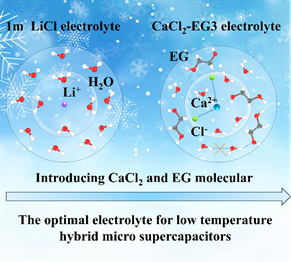Recently, the research team led by Prof. Zhong-Shuai Wu from the Dalian Institute of Chemical Physics (DICP) of the Chinese Academy of Sciences (CAS) and by Prof. Shaoxu Wang from Dalian jiaotong University has designed a cost-effective high voltage moderate-concentration hybrid electrolyte by introducing CaCl2 and ethylene glycerol (EG) additives for low-temperature and high-voltage micro-supercapacitors (MSCs), which provides a meaningful guidance for designing low-cost electrolyte with wide electrochemical stability window and anti-freezing property for intrinsically safe and environmentally adaptable devices.
Despite significant progress achieved, the toxicity and flammability of common organic electrolytes still restrict the wide application of MSCs, especially in the field of wearable electronics considering potential safety hazard and harm to human body. In this regard, intrinsically safe aqueous electrolytes hold great promise. However, the hydrogen evolution reaction and oxygen evolution reaction appearing at 2.626 and 3.856 V vs. Li+/Li respectively in neutral solution, lead to a narrow electrochemical stability window (ESW) of 1.23 V, severely limiting energy density of aqueous MSCs. More importantly, traditional aqueous electrolytes would freeze when the temperature is below the freezing point (near 0 ℃), resulting in a dramatic performance deterioration and hence hampering the normal operation of MSCs at harsh frosty conditions. High-concentration electrolyte effectively improves the energy density and anti-freezing property of aqueous MSCs, endowing them the opportunity serving as power sources for miniaturized electronics. However, the excessive usage of salt significantly increases the cost of the electrolyte. Meanwhile, salt precipitation might occur at low temperature on account of nearly saturated concentration, leading to severe performance degradation of MSCs.
This work was published as an Article in Advanced Functional Materials on Jan. 9.

(Schematic illustration of the electrolyte design for low temperature MSCs, image by Endian Yang)
Researchers have developed a CaCl2/EG synergistically modified moderate-concentration hybrid electrolyte with wide ESW and excellent anti-freezing property. In this electrolyte system, the introduction of CaCl2 remarkably decreased the content of strong hydrogen bonding water in the solution, thus widening the ESW while decreasing the concentration of salt to a minimum and endowing the hybrid electrolyte with a lower freezing point. Meanwhile, adding EG into the system can break the hydrogen networks among H2O molecules and muscle the hydrogen bonding between EG and H2O molecules, which further lowers the freezing point and enhances the conduction of Ca2+ ion.
Benefited from the synergistic effect from these two additives, the ESW of CaCl2-EG3 can be expanded to 3.5 V and the freezing resistance is significantly enhanced, enabling the as-fabricated MSCs-3 to operate normally with 62% of the capacitance retention of the room temperature and extraordinary cyclability at –40 ℃.
This work will shed new insights to design hybrid electrolytes featuring wide ESW and excellent anti-freezing properties for safe and environmentally adaptable energy storage devices.
Keywords: micro-supercapacitors, hybrid electrolyte, moderate concentration, low temperature, CaCl2/ethylene glycerol synergetic modification
Paper website: https://doi.org/10.1002/adfm.202313395